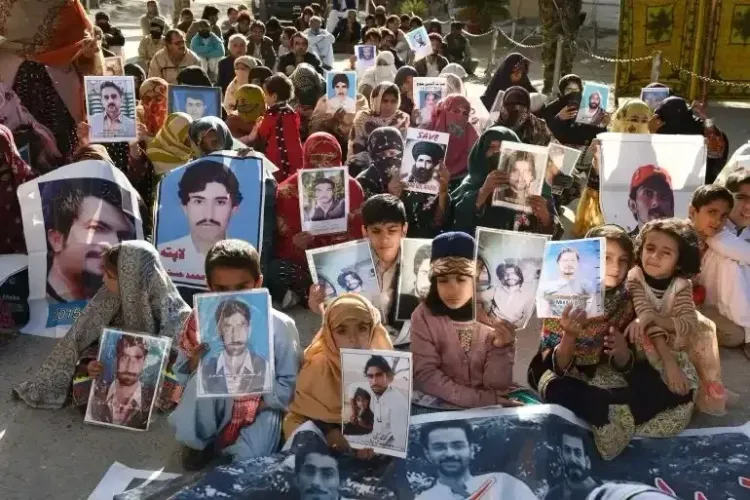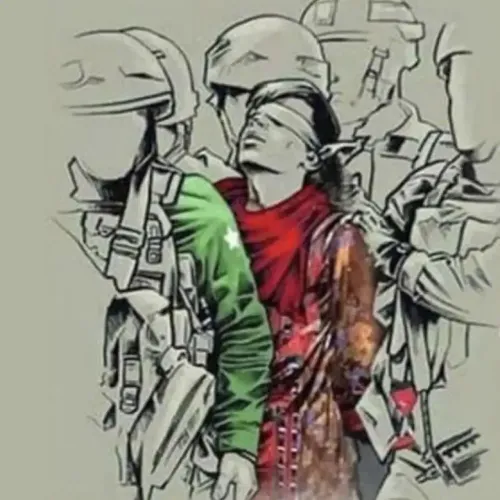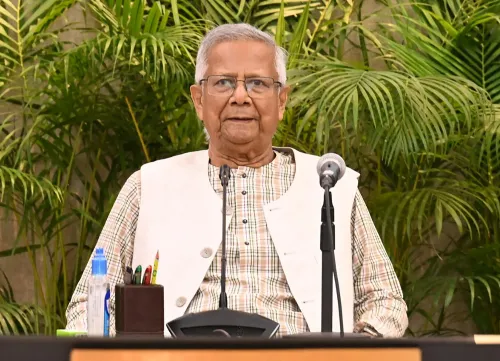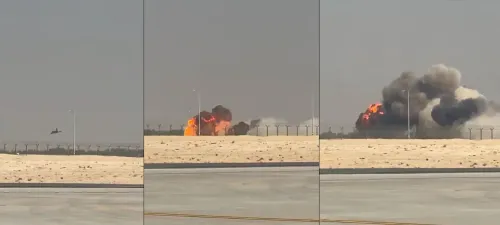How Pakistan's Actions Alienate Balochistan Amid Enforced Disappearances and Extrajudicial Killings

Synopsis
Key Takeaways
- Increasing audacity of insurgent groups in Pakistan.
- The role of the BLA in the Jaffar Express hijacking.
- Military's attempts to control the narrative rather than confronting internal issues.
- Impact of enforced disappearances on Baloch population.
- Need for systemic reforms to address grievances in Balochistan.
New Delhi: The magnitude and audacity of the attack on the Jaffar Express, a passenger train with over 400 individuals in the Bolan region of Balochistan, reveal the increasing boldness of insurgent factions in Pakistan. This incident, which involved explosives to derail the train and the subsequent hostage situation involving civilians and security personnel, underscores the deteriorating security landscape in unstable regions of Pakistan, such as Balochistan.
This violent act emphasizes the escalating security crisis in Pakistan, as terror networks gain momentum and state authority diminishes in unstable regions like Balochistan and Khyber Pakhtunkhwa. Despite the gravity of these challenges, the response from the Pakistani military has been focused on controlling the narrative instead of addressing the root causes. Rather than admitting its own shortcomings, the military has sought to shift blame towards neighboring countries, particularly Afghanistan. Such a stance risks further eroding trust and hindering progress towards resolving the systemic issues fueling unrest and insurgency in the region.
The Balochistan Liberation Army (BLA) took responsibility for the hijacking of the Jaffar Express. The group asserted that its specialized units, including the Majeed Brigade, executed the attack, which involved derailing the train and taking hostages. The BLA characterized the operation as well-planned, claiming they targeted security personnel while freeing women, children, and Baloch passengers.
Nonetheless, during a press conference on March 14, the Pakistani military, represented by ISPR DG Lt. Gen. Ahmed Sharif Chaudhry, continued its pattern of deflecting accountability, making unfounded accusations to divert attention from internal security failures. The DG claimed that Indian media had engaged in information warfare from the onset of the Jaffar Express hijacking incident.
Further complicating the narrative, the ISPR described the train hijacking as part of a broader trend of Afghan nationals actively participating in terrorist acts within Pakistan. He accused Afghanistan of orchestrating the attack while asserting that primary sponsorship originated from Pakistan's "eastern neighbor," a thinly veiled reference to India. These allegations targeted both neighboring countries, framing the incident as an externally orchestrated conspiracy against Pakistan.
This strategy exemplifies a desperate attempt by the Pakistani military to implicate external entities rather than confront the internal challenges that have enabled insurgent groups to flourish. By concentrating on blame-shifting and controlling the narrative, the military risks undermining public trust and evading the essential accountability required to address its waning authority in turbulent regions such as Balochistan.
Attributing blame to India and Afghanistan served as a convenient tactic for the ISPR to deflect responsibility for the Jaffar Express hijacking. Instead of tackling the internal security failures that facilitated the attack, the military sought to direct attention outward, casting suspicion on neighboring countries. However, this strategy did little to tackle the underlying issues and has drawn significant criticism.
The ISPR faced considerable backlash for its delayed and unclear management of the incident. Despite the seriousness of the crisis, it failed to provide timely updates or clear communication during crucial hours when accurate information was desperately needed. This lack of transparency not only heightened public anxiety but also created an information vacuum.
Insurgent groups such as the BLA and others have ramped up their assaults, targeting security forces, infrastructure, and non-Baloch workers. In February 2025 alone, Balochistan accounted for 62 percent of terrorism-related deaths in Pakistan, with 75 fatalities in 23 attacks. These incidents reflect the increasing audacity of insurgent factions and the state's failure to effectively curb their activities.
The Baloch populace has long endured marginalization and exploitation. Enforced disappearances, extrajudicial killings, and collective punishment have further alienated the Baloch community. The military's reliance on force rather than addressing legitimate grievances has only intensified the crisis. Human rights organizations have documented instances of torture and extrajudicial killings. The military has largely dismissed these claims, framing them as necessary actions against insurgents. However, this approach has only deepened mistrust and resentment among the Baloch people.
In the wake of the Jaffar Express hijacking, Pakistan's military has alleged that other nations are also implicated in incidents of enforced disappearances. Moreover, they have dismissed the issue of disappearances in Balochistan as unrelated to the hijacking, framing it as an unjustified excuse for such actions. "People go missing globally, including in the US, UK, and India. They turn to their own forces and institutions," stated the DG ISPR.
Instead of acknowledging the grievances or demonstrating empathy towards the affected families, the military has opted to defend the practice of enforced disappearances, further alienating the Baloch population and intensifying criticism of their approach.
In response, Jalila Haider, a noted lawyer and human rights advocate, emphasized on X that the root cause of Balochistan's issues lies in the lack of access to justice. She stressed that addressing this fundamental problem is crucial for resolving the region's long-standing grievances. Her remarks highlight the necessity for systemic reforms to ensure fairness, accountability, and the protection of basic rights for the people of Balochistan. She wrote, "Has forcibly disappearing people improved Balochistan's situation? Why not resolve 70 percent of Balochistan's issue by ending enforced disappearances and presenting the accused in courts?"
The Jaffar Express hijacking has revealed the state's inability to secure critical infrastructure and showcased the rising influence of militant factions. Interestingly, prior to the Jaffar Express hijacking, Maulana Fazlur Rehman, a prominent Pakistani politician and cleric, made a striking statement in the National Assembly on February 18. In his speech, he openly criticized the government, asserting that it had effectively lost control over key regions such as Khyber Pakhtunkhwa and Balochistan. His comments underscored the deteriorating state authority in these areas, where insurgency, lawlessness, and governance failures have become increasingly prevalent.
The ongoing marginalization of the Baloch people, combined with the state's weakening authority and oppressive policies, lies at the core of the rising terrorism in Balochistan. Decades of systemic neglect, exploitation of natural resources, and denial of basic rights have fueled resentment and alienation among the Baloch populace. Instead of addressing these grievances, the Pakistani military has relied on heavy-handed tactics, including enforced disappearances and collective punishment, while refusing to take accountability for its actions. This approach has not only deepened mistrust but also left the Baloch people without legitimate avenues to voice their concerns or seek justice. Consequently, insurgency and terrorism have surged, propelled by a sense of desperation and the absence of meaningful alternatives. Without a transition towards accountability, justice, and inclusive governance, the cycle of violence is likely to continue, further destabilizing the region.
(Deepak Kumar is a security and strategic affairs analyst specializing in geopolitics and geo-economics. The views expressed are personal.)








